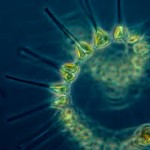Crowdsourced DNA Project to Speed Up Research
 A new crowdsourced citizen science project could speed up some microbial research by nearly 40,000 years. Uncovering Genome Mysteries is a new project being hosted on IBM’s World Community Grid. Researchers are hoping to unlock the biological secrets of marine microbes from all over the world, whether they are in Botany Bay in Australia or the Amazon River in Brazil.
A new crowdsourced citizen science project could speed up some microbial research by nearly 40,000 years. Uncovering Genome Mysteries is a new project being hosted on IBM’s World Community Grid. Researchers are hoping to unlock the biological secrets of marine microbes from all over the world, whether they are in Botany Bay in Australia or the Amazon River in Brazil.
Understanding the genetic similarities between microbes could lead to new medicines, new crop technologies and new eco-friendly materials. And that’s just for starters!
The project is hoping to make 20 quadrillion comparisons of 200 million proteins underlying a wide variety of organisms that are invisible to the naked eye. It has been estimated that this mammoth task would take about 40,000 years on a single PC, yet only a few months with the right amount of volunteers.
All volunteers have to do is donate their spare computer capacity to the grid.
“Anyone with a computer, smartphone or tablet can join and help to give us the computational power to carry out our microbe research,” says Professor Torsten Thomas, one of the crowdsourced project’s leaders.
Microbes Rule OK
Microbes rule the world and without them we would perish. For example, they drive oceanic life, created the breathable atmosphere, extract greenhouse gases from the air and make soil fertile. They make some great beer as well!
For much of the planet’s history, microbes were the only inhabitants and they account for most of the biodiversity on the Earth. However, we know so little about them as less than one percent of this biodiversity has been studied. Just think what discoveries lay in wait when the rest have been researched in detail.
Benefits of New Knowledge
The team behind Uncovering Genome Mysteries hope that the end result of the project will be an open-access database of the protein sequence comparisons. This will help researchers discover new enzymatic functions and find out how organisms interact with each other and the environment. In addition to the possible benefits listed at the top of this post, new knowledge about microbes could lead to cleaner air, water, energy and more resilient crops.
Anyone wanting to donate their idle computer time, can sign up here.
Reader Comments
I don't agree, read
http://www.neurodegenerationresearch.eu/wp-content/uploads/2015/10/Fact-Sheet_EADB_v3.pdf
Friendly, Malia
Posted by malia1964 on July 23, 2016
I m microbiologist and I m ready to participante to this study by diffrent Ways
Posted by Jabbouri on October 29, 2014
Add your Comment
[LOGIN FIRST] if you're already a member.fields are required.
